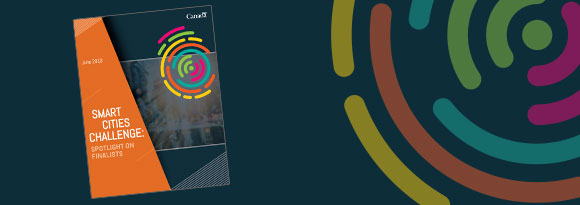City of Richmond, British Columbia
This page has been archived on the Web
Information identified as archived is provided for reference, research or recordkeeping purposes. It is not subject to the Government of Canada Web Standards and has not been altered or updated since it was archived.
The first round of the Smart Cities Challenge is closed. The Government of Canada announced the four winners (City of Montréal, Québec; Nunavut Communities, Nunavut; City of Guelph and County of Wellington, Ontario; and Town of Bridgewater, Nova Scotia) on May 14, 2019.

Executive Summary
- PDF Version (210.05 KB)
- HTML Version
"I think what excited me most about the smart cities project is that it's an opportunity to use some cutting edge technology to help make Richmond more resilient, and this can be something that we can showcase and use some of the lessons learned towards other cities in the province…"
– Jesal Shah, Director, Flood Protection Program, Emergency Management BC, Province of BC
"A smart city is one, I think, that anticipates, practices and invests in infrastructure and technology to improve the daily lives, essentially, of the residents of the municipality."
– Tom Corsie, Vice President, Real Estate, Vancouver Fraser Port Authority
Challenge Statement
Richmond, an island city with a rapidly growing and diverse population and home of nationally significant infrastructure and government services, requires resilient physical and virtual platforms that are integrated seamlessly across all levels of government to enhance quality of life in day-to-day activities and minimize community impacts from major disasters.
Summary
Richmond is comprised of 17 islands at the mouth of the Fraser River, on the West Coast. A gateway to the Asia Pacific, over 65% of the population originates from Asia Pacific countries. Home to YVR, the Port of Vancouver, and 30 minutes from the US border, Richmond's population, currently 220,000, is expected to reach over 300,000 with the City Centre population tripling, by 2041.
Multi-levels of government and businesses have incident response plans and activation protocols utilizing for communication technology, decision making, and asset mobilization/ movement during an incident. The challenge is systems are not currently interconnected and integrated. This impedes response efforts, resulting in nuisance for citizens with minor events or potentially more serious consequences associated with major events.
Richmond has invested in stable, reliable infrastructure and services as the basis for implementation of the Smart Cities Challenge. Citizen communication and built-in system resilience are essential to an integrated platform enabling data driven decision making to improve response rates and reduce recovery time.
Project goals: Protect our island city; Integrate citizen, infrastructure and emergency data and communication platforms; Bridge language barriers; and Create scalable systems that both enhance daily life and improve emergency response rates and recovery times.

Spotlight on Finalists:
City of Richmond, British Columbia
Population: 198,310
Focus Areas:


Prize Category:

#smartcitiesCanada
The Jury's Perspective
Read the transcript
My name is Kourosh Rad. I'm an urban planner from Halifax, Nova Scotia.
It's very exciting to be part of an open and transparent challenge that will result in using the technology to improve the everyday life of the communities and community members. It's exciting to see so many communities coming forward with all kinds of different ideas and innovations that is well-founded within their communities. I was very interested to be part of the jury to discuss these applications and both learn from them and also help them shape the future of the final application.
Richmond has done a really good job of identifying the challenge that they face from a natural perspective. They have taken a deep look at how technology can help their people at the times of emergency and they have done a good job of identifying lifesaving technologies that will help at the time of emergency, but they've gone one step beyond that and they've actually looked at how this lifesaving technology can help the everyday life of the citizens. So for example, they've looked at emergency response, not at the time of a natural disaster, but also at the time of traffic control. If there's an accident, they can utilize the technologies that they've introduced to respond to both emergencies and crisis on a daily basis.
The Finalist's Perspective
Read the transcript
The smart cities challenge is a competition that called in Canadian communities to explore how data and connected technology can achieve meaningful outcomes for residence.
On screen:
Smart Cities Challenge
Winning communities
School
The finalists
$10M category: City of Richmond, British Columbia
Tell us about your team and your community
Denise Tambellini (Manager, Intergovernmental Relations, City of Richmond): our team is comprised of an advisory committee that's made up of partners including the port of Vancouver, Vancouver international airport, tech companies such as MDA, CR wireless, a wide range of partners that are there to provide support and direction. Richmond is comprised of 17 islands, we have about 220, 000 people approximately 73% of our population is from Asia pacific countries and 32% of our populations don't speak either English or French.
On screen: Why did you enter the challenge?
Denise Tambellini (Manager, Intergovernmental Relations, City of Richmond): disaster mitigation is probably the only area where our tax payers asks us specifically if they're paying enough to keep our island safe. This is the number one priority for our council as well as we know our community. So, we figure this is—if we can provide an opportunity to improve the daily lives, the everyday lives of our community as well as provide an opportunity to seamlessly transition into more informed and faster emergency response using the same technology then we'll be better off as a city.
On screen: Challenge statement: Richmond, an island city with a rapidly growing and diverse population and home of nationally significant infrastructure and government services, requires resilient physical and virtual platforms that are integrated seamlessly across all levels of government to enhance quality of life in day-to-day activities and minimize community impacts from major disasters.
Join the conversation: #smartcitiesChallenge
Infrastructure Canada
- Date modified: